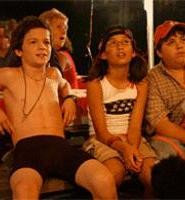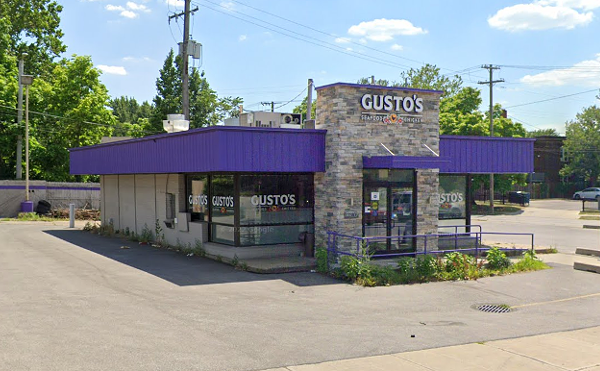For Cuesta, as for fellow filmmaker Todd Solondz, childhood is a vicious affair. Where there isn't violence, there is the threat of violence, or violation. And never mind the inner city, poverty, or any external condition that has a tendency to annihilate innocence: Cuesta's misery occurs under a veil of safety, in prim suburban homes, where youth is supposed to happen by the baseball-and-barbecue book. His children are alone among wolves, and his parents? More wolves -- or at least ghosts.
The trouble with 12 and Holding, which pits four young protagonists in intertwining battles for spiritual (and, well, literal) survival, is that it's just too much. The problem is not that Cuesta won't allow us to relax; artfully, he keeps us edgy and scared, pinned in the same menacing landscape his characters inhabit. It's that the film's litany of catastrophe accrues to a point where it loses meaning. After so many incidents in which the worst might happen and sometimes does, we can' t feel the emergency. We can only feel numb -- or worse, abused. The stakes were high enough already.
The movie opens with a chase: Two bullies pursue a couple of boys on bikes, pelting them with stones. The boys scurry up a ladder into a treehouse and, when the bullies ascend, overturn a bucket of piss on their heads. It's a relief, but it doesn't last long. The boys, twins Rudy and Jacob Cargas (both played by Conor Donovan), are engaged in their own conflict. As soon as the bullies retreat, Rudy turns on mild-mannered Jacob, who wears a hockey mask to cover his facial birthmark. Back at home, when their parents give them a joint birthday present, it 's clear that Rudy is the favored child. Berry-faced Jacob is withering on the vine.
12 and Holding's two other protagonists are marvels of preteen knowingness. Malee, played by the magnificent Zoë Weizenbaum, is a frank girl who has long since accepted the fecklessness of her therapist mother (Annabella Sciorra). On the morning of her first menstrual period, Malee puzzles over the tampon and briefly leaves the bathroom to ask for help. But when she sees her mother pacing on the telephone, throwing a hissy fit at Malee's absent father, Malee shrugs and returns to the bathroom. As with everything else, she'll have to manage this rite of passage on her own.
Completing the foursome is Leonard, a fat boy played with sensitivity by Jesse Camacho. At home, Leonard lives among a nuclear family of jiggling white heft, placated (in fact, silenced) by an endless supply of fattening food. At gym class, where Leonard endures the usual humiliations, the football coach hands him a couple of books on nutrition and exercise with the promise of a future spot on the team. "Coach, why are you doing this for me?" Leonard asks, which in any other movie would be an opening akin to taking out a cracker to receive the incoming cheese. In this movie? "Because I have never met a child so out of shape in my life."
Of course, they're still kids, no matter how sophisticated, and what they don't know can hurt them. Malee develops a crush on one of her mother's patients and enacts a stalking campaign that threatens to destroy her life, or at least her soul. In a misguided attempt to force his mother off food, Leonard nearly kills them both. And Jacob and Rudy meet with violence, one as victim and the other as perpetrator. The fact that Cuesta offers some hope of salvation -- that each child makes a change, no matter how twisted -- is of no comfort. Too much has already happened for us to trust it.
Cuesta knows that in many homes, children are neither seen nor heard; they have to resort to drastic acts to get attention. Parents are so preoccupied with their personal dramas -- and so busy acting out their own needs and fears -- that they can't offer the real support their children need. Meanwhile, young people flounder and flail, fielding attacks without any troops. Maybe they survive, and maybe they don't. These themes are rich and well worth dramatizing; indeed, Cuesta has them up and running from the start. Then, unfortunately, he runs them into the ground.










